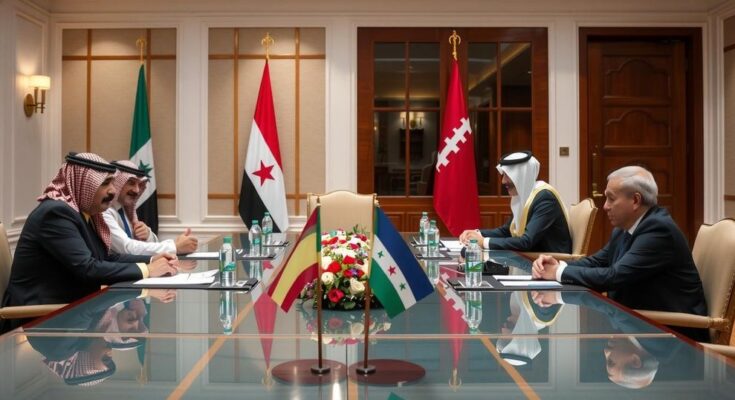Arab states are initiating dialogue with all factions in Syria to prevent a revival of civil conflict following recent instability in Assad’s regime, emphasizing an inclusive transition that represents all ethnic groups within the country.
Arab states, led by Qatar, are initiating discussions with all involved forces in Syria to prevent the resurgence of civil conflict following the recent instability of President Bashar al-Assad’s regime. Majed al-Ansari, spokesperson for Qatar’s foreign ministry, emphasized the necessity for an inclusive transition that represents the diverse Syrian populace. He acknowledged the current absence of significant violence has created a more favorable environment for international engagement before hostilities can arise among various factions. Al-Ansari expressed cautious optimism regarding the preservation of state institutions, which are crucial for stability: “We are encouraged that the government institutions retain their functions.”
However, he admitted there remains uncertainty regarding which military groups are dominant and the overall situation of Syria’s national army. To avert a resurgence of violence, he asserted the need for coordinated dialogue between regional powers and military factions on the ground. Citing the potential for Syria to resemble other tumultuous scenarios in the Arab Spring, he remarked: “There is a tendency in the region for good news to turn into bad news.”
While Qatar has not recognized Assad’s rule, it acknowledges Turkey’s significant role due to its historical connections and the influx of Syrian refugees. Al-Ansari urged Israel to refrain from any escalatory maneuvers until dialogue is initiated within Syria. He hinted at the potential inclusion of the Islamist militant group Hayat Tahrir al-Sham in future discussions, emphasizing a willingness to consider their contributions: “We do not deal with them as a preconceived notion that they cannot be reformed.”
On the topic of accountability, he maintained it is up to the Syrian populace to determine Assad’s fate and the future of Russian military presence in Syria, advocating for a shift away from the status quo that has led to immense suffering among Syrians. Regarding Assad’s current situation, Al-Ansari stated cryptically, “He is in the wind. He is no longer in the city.”
The Syrian civil conflict, which has ravaged the country for over a decade, has seen various factions vying for power amidst the backdrop of complex international interests. As President Bashar al-Assad seemingly faced a significant decline in control, Arab states perceive an opportunity to mediate and potentially stabilize the situation. Qatar has been notably critical of Assad’s regime and continues to engage with opposition forces. Amidst the shifting landscape, maintaining an inclusive dialogue involving all factions in Syria is deemed essential to prevent further conflict and enable a peaceful transition. The role of regional players such as Turkey and Israel further complicates the context, as their involvement could influence the outcome of any proposed dialogue or military engagement. The pressing need for good governance and reconstruction reflects the broader aspirations of the Syrian populace who have endured substantial sacrifices throughout this protracted crisis.
In summary, the Arab states, particularly Qatar, are taking proactive measures to facilitate dialogue among various military and political factions in Syria to prevent a resurgence of civil strife. There is a concerted effort to ensure that the transition is representative and inclusive of all Syrians, irrespective of their ethnic backgrounds. The situation remains fluid, with underlying challenges that must be addressed through open communication and strategic collaboration among regional powers. The path forward is fraught with uncertainty, yet there is a shared vision for a Syria that embodies the aspirations of its people, devoid of further bloodshed.
Original Source: www.theguardian.com




